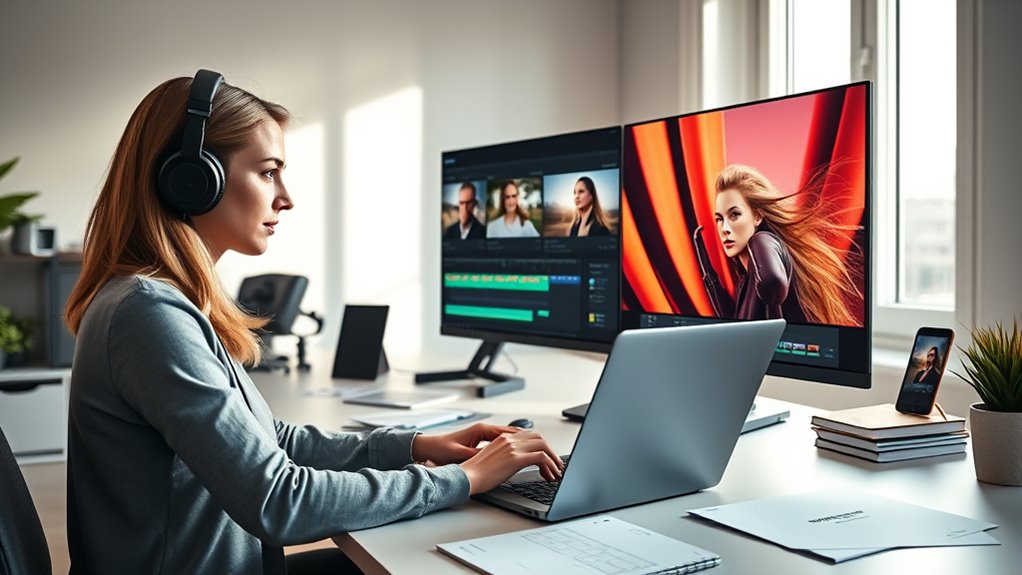To succeed in video editing for German businesses, you need strong skills in industry-standard software like Adobe Premiere Pro, Final Cut Pro, or DaVinci Resolve, along with expertise in color grading, sound design, and visual effects. Remote collaboration requires reliable internet, cloud storage, and project management tools to stay organized and meet deadlines. Staying updated with industry trends guarantees your content remains engaging and competitive. Keep exploring to discover more ways to elevate your video editing expertise.
Key Takeaways
- Proficiency in industry-standard editing software like Adobe Premiere Pro and DaVinci Resolve to meet high-quality content demands.
- Skills in color grading, visual effects, and sound design to enhance video professionalism and engagement.
- Ability to collaborate remotely using cloud storage, project management tools, and reliable internet connections.
- Continuous learning of new editing techniques, social media formats, and emerging trends such as 360-degree videos and AR.
- Understanding regional market data and audience preferences to create targeted, impactful videos for German businesses.

In today’s digital landscape, video editing has become essential for German businesses looking to stand out and engage their audiences effectively. As more companies realize the power of visual content, staying abreast of industry trends is paramount. The latest industry trends emphasize dynamic storytelling, high-quality visuals, and seamless integration of motion graphics. To keep up, you need to develop strong technical skills that enable you to adapt to these evolving demands. Mastering tools like Adobe Premiere Pro, Final Cut Pro, or DaVinci Resolve becomes fundamental, as they are industry standards that facilitate professional-grade edits. Additionally, understanding color grading, sound design, and visual effects can help elevate your videos and align with current market expectations.
In the domain of remote work, honing your technical skills allows you to collaborate effectively across distances. You can work with clients and team members from anywhere in Germany or beyond, provided you have reliable internet and the right software. Remote video editing requires a disciplined approach to file management, version control, and communication. You’ll need to familiarize yourself with cloud-based storage solutions and project management tools to keep workflows smooth and organized. Furthermore, staying updated with industry trends means regularly exploring new editing techniques, trends in social media content, and emerging formats like vertical videos or 4K resolution. It’s essential to be proactive in learning and adapting, as these trends influence what clients expect from professional editors. Keeping informed about divorce statistics and other regional data can also help tailor content to specific audiences, enhancing engagement.
Your technical skills are also indispensable for meeting deadlines and producing high-quality content efficiently. As a remote video editor, you’re responsible for managing your own schedule and ensuring timely delivery without sacrificing quality. This often involves developing a deep understanding of your editing software’s shortcuts, automation features, and plugins to speed up workflows. The industry is moving toward more immersive content, so investing time in learning about 360-degree video editing or augmented reality integration can give you a competitive edge. By staying connected with industry trends and continuously sharpening your technical skills, you position yourself as a valuable asset to German businesses seeking impactful video content. This proactive approach helps you deliver compelling videos that resonate with audiences, boost brand visibility, and meet the modern standards of digital marketing.
Frequently Asked Questions
What Are the Legal Considerations for Video Content in Germany?
You need to guarantee copyright compliance and licensing requirements are met when creating video content in Germany. Always verify that you have permission for any copyrighted material, like music or images, to avoid legal issues. Use licensed assets or creative commons content. Additionally, be aware of data protection laws, especially if your videos include personal data. Following these legal considerations helps protect your business from potential fines or legal disputes.
How Do Language Barriers Affect Remote Video Editing Collaboration?
Language barriers can turn remote video editing collaboration into a maze of miscommunication. You might find yourself lost in translation, where subtle cues get missed and instructions are misunderstood. Communication challenges become obstacles, slowing down progress and risking quality. To navigate this, you need clear, simple language and regular check-ins. Embracing patience and using visual cues can bridge gaps, turning potential pitfalls into opportunities for stronger teamwork.
Which Software Is Most Popular Among German Video Editors?
You’ll find Adobe Premiere Pro is the most popular software among German video editors, thanks to its robust editing tools and professional features. Many also prefer DaVinci Resolve for its powerful color correction capabilities. These popular editing tools help you streamline your workflow and produce high-quality videos efficiently. Whether working remotely or in a studio, choosing these software options guarantees you stay competitive and meet client expectations effectively.
How Can German Businesses Ensure Data Privacy in Remote Editing?
You can’t just toss sensitive footage into the cloud and hope for the best, right? Instead, you should implement robust encryption protocols and strict access controls. These measures act like digital bouncers, keeping data private and secure. By doing so, you guarantee that only authorized personnel access your files, maintaining compliance with privacy laws and giving you peace of mind—because nothing screams professionalism like safeguarding your clients’ secrets.
What Are the Cost Differences Between In-House and Freelance Editors?
You’ll find that in-house editors often have fixed salaries and benefits, making costs predictable but potentially higher overall. Freelance editors usually charge per project or hour, offering flexible pricing models that can lower costs for short-term needs. To guarantee quality assurance, set clear expectations and review their portfolios. Comparing these options helps you balance budget and quality, ultimately choosing the best approach for your German business’s video editing needs.
Conclusion
Mastering video editing opens doors to global opportunities, yet the craft remains rooted in local business needs. As you sharpen your skills, you bridge the gap between creative expression and practical impact, transforming simple clips into powerful marketing tools. While remote work offers flexibility, it also demands discipline and adaptability. Embrace both worlds—you’ll find that blending technical prowess with cultural understanding elevates your work, making you indispensable in Germany’s dynamic business landscape.









